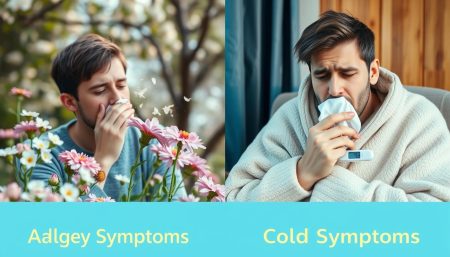In the world of immunology, non-allergic rhinitis is a mystery. It puzzles both patients and doctors. They wonder if there’s a real rhinitis autoimmune connection. This could change how we diagnose and treat it.
Exploring the link between immune system disorders and non-allergic rhinitis is complex. It involves looking at environmental factors, how our bodies react, and what doctors think. This is a new area of study.
Non-allergic rhinitis causes inflammation in the nose without an allergy. It’s hard to understand because it’s not clear why it happens. For the millions dealing with it, knowing if it’s part of an autoimmune disease is important. It helps doctors make better choices and improves life quality.
This topic is important and urgent. This article aims to explain the connection between non-allergic rhinitis and autoimmune disease. It also looks at how this affects our health.
Key Takeaways
- Non-allergic rhinitis is a non-allergic inflammation of the nasal passages with various causes.
- Understanding the potential relationship between non-allergic rhinitis and autoimmune diseases is crucial for optimal patient care.
- Clarification of the rhinitis autoimmune connection is needed for more accurate diagnosis and treatment strategies.
- Autoimmune disease encompasses a spectrum of immune system disorders, potentially influencing rhinitis.
- Identifying the differentiators between allergic and non-allergic rhinitis is key to managing chronic nasal inflammation.
- Research continues to evolve in the areas of immune response and non-allergic nasal inflammation.
Understanding Non-Allergic Rhinitis
Non-allergic rhinitis is a condition where the nasal passages get inflamed but it’s not an allergic reaction. It has its own set of symptoms, different from allergic rhinitis.
Definition and Symptoms
This condition causes long-term inflammation in the nasal mucosa, not from an allergic reaction. Symptoms include a stuffy nose, runny nose, sneezing, and postnasal drip. These symptoms don’t come from typical allergens like pollen or pet dander.
Causes and Risk Factors
The exact causes of non-allergic rhinitis are still being studied. But, we know that things like smoke, pollution, and strong smells can make it worse. Hormonal changes, some medicines, and health issues can also increase the risk.
| Risk Factor | Association with Non-Allergic Rhinitis |
|---|---|
| Environmental Irritants | Strong association |
| Hormonal Changes | Moderate association |
| Medications | Variable impact based on type |
| Underlying Health Conditions | Potentially significant impact |
Knowing these factors is key to managing and treating non-allergic rhinitis. It shows the importance of personalized treatment plans.
Exploring Autoimmune Disease Fundamentals
Autoimmune diseases are complex and affect the immune system. They make it attack the body’s own cells. Knowing the symptoms is key to early detection and treatment.
What is an Autoimmune Disease?
Autoimmune diseases happen when the immune system attacks healthy cells. This can cause many symptoms and long-term health problems. The exact reason is often unknown, but genetics, environment, and hormones play a role.
Common Types and Symptoms
There are many types of autoimmune diseases, each affecting different parts of the body. For example, rheumatoid arthritis affects joints, lupus impacts skin and organs, and type 1 diabetes targets the pancreas. Symptoms include inflammation, pain, swelling, and fatigue, making daily life hard.
Spotting symptoms early is crucial for managing autoimmune diseases. This knowledge is the first step to understanding how these diseases interact with other conditions. This is especially important when looking at non-allergic rhinitis, as discussed later.
Is Non Allergic Rhinitis: an Autoimmune Disease?
Many people with non-allergic rhinitis wonder if it’s an autoimmune disease. To answer, is non allergic rhinitis an autoimmune disease? It’s important to know the difference between autoimmune responses and the inflammation in non-allergic rhinitis.
Autoimmune diseases happen when the body’s immune system attacks its own cells. It thinks these cells are invaders. This leads to various symptoms, depending on the affected organs or cells. The immune response is strong but wrong.
Non-allergic rhinitis, however, doesn’t involve the immune system attacking the body. It’s mainly caused by inflammation in the nasal mucosa due to things like environmental irritants, hormonal changes, or certain medicines. Symptoms like a runny nose and nasal congestion happen without the typical immune response seen in autoimmune diseases.
To better understand these conditions, let’s look at a comparison:
| Characteristic | Autoimmune Disease | Non-Allergic Rhinitis |
|---|---|---|
| Underlying Cause | Immune system attacks body’s own cells | Non-immune triggers like environmental changes, irritants |
| Common Symptoms | Varies widely (joint pain, fatigue, skin rash) | Nasal congestion, runny nose |
| Immune Response | Hyperactive, often systemic | Localized, non-immune based inflammation |
In short, non-allergic rhinitis is not an autoimmune disease. It’s a condition with nasal symptoms that don’t come from an autoimmune response. Knowing this helps in managing the condition and finding the right treatment.
Distinguishing Between Allergic and Non-Allergic Rhinitis
It’s important to know the difference between allergic and non-allergic rhinitis. Both affect the nasal passages but in different ways. Their triggers and the inflammation are quite different.
Understanding the Immune Response in Allergic Rhinitis
Allergic rhinitis happens when the immune system reacts to things like pollen or pet dander. When someone with allergic rhinitis breathes in these allergens, their body sees them as threats. This leads to the release of histamine and other chemicals.
Symptoms include nasal congestion, sneezing, and itchy eyes. The immune response is key in telling allergic from non-allergic rhinitis.
Triggers of Non-Allergic Rhinitis
Non-allergic rhinitis doesn’t come from an immune reaction to allergens. It can be caused by things like weather changes, spicy foods, or cigarette smoke. Symptoms come from irritation of the nasal passages, not an immune response.
Knowing what triggers non-allergic rhinitis is crucial for managing it.

Both types of rhinitis can really disrupt daily life. But knowing the cause helps find better ways to treat symptoms. This can improve life quality a lot.
The Rhinitis Autoimmune Connection
Looking into the relationship between rhinitis and autoimmune disorders helps us understand their impact on health. The rhinitis autoimmune connection shows how autoimmune disorders can make rhinitis symptoms worse. This makes it hard to diagnose and treat.
How the Immune System Affects the Nasal Passages
Autoimmune-related rhinitis starts with the immune system attacking healthy cells in the nose. This leads to inflammation and symptoms like sneezing, congestion, and irritation. These symptoms are similar to those seen in regular rhinitis, showing how complex immune system disorders can be.
Autoimmune Disorders with Rhinitis Symptoms
- Systemic Lupus Erythematosus (SLE) often presents rhinitis-like symptoms due to mucosal inflammation.
- Rheumatoid Arthritis (RA) can trigger secondary Sjögren’s syndrome, leading to dry airways and subsequent nasal symptoms.
- Granulomatosis with Polyangiitis may exhibit severe rhinitis as a primary symptom before other systemic manifestations appear.
Learning about these disorders helps us improve how we diagnose and treat them. The rhinitis autoimmune connection gives us important insights into how immune system disorders affect breathing.
Diagnosing Non-Allergic Rhinitis and Autoimmune Diseases
Diagnosing non-allergic rhinitis and autoimmune diseases is a detailed process. It involves several steps to ensure the right treatment. Symptoms of chronic rhinitis can be similar to those of immune system disorders. This makes it hard for doctors to find the exact cause.
Doctors start by taking a detailed patient history. They look for patterns in symptoms and any triggers that don’t seem to be allergic. They also do a thorough physical exam to check for signs of immune system problems.
- Examination of nasal passages to check for polyps or other abnormalities.
- Blood tests to rule out autoimmune markers and check overall immune function.
- Allergy tests to conclusively rule out allergens as the cause of rhinitis.
If chronic rhinitis might be linked to an autoimmune disease, more tests are used:
- Immunological tests to detect specific auto-antibodies.
- Imaging tests, such as MRI or CT scans, to evaluate sinus structures and other internal systems potentially affected by autoimmune diseases.
Doctors from different fields, like allergists and immunologists, work together to diagnose. They carefully review all the findings to make an accurate diagnosis.
| Condition | Diagnostic Tool | Key Indicator |
|---|---|---|
| Non-Allergic Rhinitis | Patient History, Physical Examination | Absence of Allergen Sensitivity |
| Autoimmune Disorders | Blood Tests, Immunological Assessments | Presence of Auto-antibodies |

The goal is to match the treatment with the diagnosis for better patient outcomes. Understanding the link between chronic rhinitis and immune system disorders helps in choosing the right treatment. This improves the quality of life for those affected.
Treatment Options for Non-Allergic Rhinitis
Understanding the treatment options for non-allergic rhinitis can help manage the condition better. This section looks at medical treatments and lifestyle changes. It also covers home remedies to ease nasal inflammation.
Medical Interventions
Effective treatment for non-allergic rhinitis often starts in the doctor’s office. Doctors may recommend several treatments based on the severity and symptoms:
- Antihistamines – Though usually for allergies, they can sometimes help non-allergic rhinitis by reducing inflammation.
- Nasal Sprays – Steroid sprays are great for reducing inflammation and swelling in the nasal passages.
- Saline Solutions – Regular use of saline can keep the nasal passages clean and reduce irritation.
It’s important for patients to talk to their doctors to find the best treatment. This is especially true to tell the difference between symptoms from allergies and non-allergic rhinitis.
Lifestyle Changes and Home Remedies
There are also lifestyle changes and home remedies that can help manage symptoms:
- Humidifiers – Using a humidifier at home can add moisture to the air. This may help soothe dry nasal passages.
- Avoiding Irritants – Staying away from tobacco smoke, strong perfumes, and other pollutants can reduce nasal irritation.
- Dietary Adjustments – Eating spicy foods can trigger nasal inflammation in some people. They should be eaten carefully.
By making these changes, symptoms of non-allergic rhinitis can be greatly reduced. This leads to a more comfortable daily life.
Together, medical treatments and home remedies offer a complete plan for managing non-allergic rhinitis. By following professional advice and making smart lifestyle choices, people can control their symptoms. This improves their overall quality of life.
Managing Autoimmune Diseases and Nasal Inflammation
When dealing with autoimmune diseases, it’s key to use both medical treatments and natural methods. Combining the right medicines with lifestyle changes can greatly improve immune health. This is especially true for those with autoimmune-related nasal inflammation.
Medication and Therapies for Autoimmune Diseases
Today, there are many treatments for autoimmune diseases. These aim to control the immune system and reduce inflammation. Doctors often use biologics, immunosuppressants, and corticosteroids to manage symptoms and improve life quality.
Diet and Lifestyle Adjustments for Immune System Disorders
Along with medicine, changing your diet and lifestyle is vital. Eating foods that fight inflammation and avoiding processed foods can help. Also, staying active, getting enough sleep, and managing stress are good for your immune system.

Here’s a list of dietary and lifestyle changes that can help manage autoimmune diseases and support a healthy immune system:
| Dietary Recommendations | Lifestyle Adjustments |
|---|---|
| Increase omega-3 fatty acids | Regular moderate exercise |
| Avoid gluten and processed sugars | Adequate sleep (7-9 hours) |
| Include anti-inflammatory foods | Stress reduction techniques |
The Impact of Chronic Rhinitis on Quality of Life
Living with chronic rhinitis is more than just dealing with sneezing and stuffiness. It affects both your physical health and mental well-being. The constant symptoms force you to change your lifestyle, impacting your daily life and mood.
The Psychological Aspect of Chronic Conditions
The psychological impact of chronic illness like chronic rhinitis is huge. It can cause frustration, anxiety, and even depression. The unpredictable nature of symptoms makes planning hard, as you worry about sudden flare-ups.
“Chronic conditions often carry a burden that extends beyond the physical symptoms, seeping into the psychological well-being of those affected.”
Strategies for Coping with Chronic Rhinitis
Finding effective ways to cope with chronic rhinitis is key. These strategies help manage symptoms and keep your mental health stable.
- Regular consultations with healthcare providers to adjust treatment plans as needed.
- Incorporation of gentle physical activities like yoga or walking to boost overall health.
- Engagement in support groups to connect with others facing similar challenges.
- Practicing relaxation techniques such as meditation or deep-breathing exercises to reduce stress.
Keeping your indoor environment clean can also help. Use air purifiers and avoid dust and allergens to reduce triggers.
| Coping Mechanism | Benefit |
|---|---|
| Regular medical reviews | Ensures treatment remains effective |
| Physical activity | Enhances physical health and emotional resilience |
| Support group participation | Provides emotional support and valuable information |
| Relaxation practices | Decreases stress-related flare-ups |
Emerging Research on Non-Allergic Rhinitis and Immune System Disorders
New research in non allergic rhinitis and immune system disorders is changing how we see nasal inflammation and immunity. These findings could lead to new treatments and help us understand these conditions better.
Studies show that symptoms of non-allergic rhinitis might be linked to immune system problems. This connection is sparking new ideas and more research into how to treat these conditions.
- Genetic Factors: Scientists are looking at genes that might make people more likely to have non-allergic rhinitis and immune system issues.
- Environmental Impact: They’re also studying how the environment can make non-allergic rhinitis and immune problems worse.
- Clinical Trials: There are ongoing trials to test new treatments that don’t involve medicine.
Researchers are excited about new treatments that aim to fix how the immune system works. They hope these treatments will make symptoms of non-allergic rhinitis less severe.
| Research Area | Key Focus | Status |
|---|---|---|
| Immunological Studies | Understanding molecular pathways | Ongoing |
| Pharmacological Advances | Development of targeted therapies | In Trial |
| Behavioral Research | Lifestyle factors influencing symptoms | Data Collection |
The future of non allergic rhinitis research and immune system disorder advancements is very promising. With each new finding, scientists are getting closer to understanding how our immune system works. This could lead to better treatments for non-allergic rhinitis that are tailored to each person.
“As we connect these dots, the potential for significant breakthroughs in treating and understanding non-allergic rhinitis and immune system disorders becomes increasingly tangible.”
Conclusion
We’ve looked into non allergic rhinitis and its link to autoimmune diseases. It’s important to know the difference between non allergic rhinitis and other types. This helps in finding the right treatment.
Understanding the symptoms of non allergic rhinitis is key. It helps doctors find the best treatment. This makes a big difference in how well people feel.
Getting the right diagnosis is very important. Doctors use special tools to figure out what’s going on. They might also do more tests to be sure.
When it comes to non allergic rhinitis, finding what triggers it is crucial. Then, doctors can tailor treatments to fit each person’s needs. This can include making lifestyle changes or even surgery.
Our main point is that non allergic rhinitis needs its own special attention. It’s different from other nasal problems because it doesn’t involve allergies. While there might be some links to autoimmune diseases, more research is needed.
We want to help people understand their health better. We aim to support those dealing with complex health issues. Our goal is to help everyone feel better and find comfort.
FAQ
Q: What is non-allergic rhinitis, and how is it different from allergic rhinitis?
A: Non-allergic rhinitis is a condition that causes chronic sneezing, congestion, or a runny nose. It’s not caused by allergies. This makes it different from allergic rhinitis, which is triggered by allergens and involves the immune system’s response.
Q: Can non-allergic rhinitis be a symptom of an autoimmune disease?
A: Non-allergic rhinitis itself is not an autoimmune disease. But, some autoimmune diseases can have symptoms similar to rhinitis. The causes and immune responses are different, though.
Q: What are the common symptoms of autoimmune diseases?
A: Symptoms vary by disease but often include fatigue, joint pain, skin problems, and chronic inflammation. If you have rhinitis-like symptoms, it might be due to an autoimmune reaction in your nasal passages.
Q: What are the triggers for non-allergic rhinitis?
A: Triggers include environmental factors like smoke and perfume, changes in weather, infections, certain medications, and foods. Hormonal changes and stress also play a role.
Q: How is non-allergic rhinitis diagnosed?
A: Diagnosis involves a clinical evaluation, looking at symptoms and medical history, and ruling out allergies. Sometimes, a nasal endoscopy or CT scan is used to check for structural abnormalities and other conditions.
Q: What treatment options are available for non-allergic rhinitis?
A: Treatments include nasal sprays, antihistamines, decongestants, and saline rinses. Avoiding known triggers and making lifestyle changes can also help manage symptoms.
Q: Are there any lifestyle changes that can improve symptoms of autoimmune diseases and nasal inflammation?
A: Yes, a balanced diet, regular exercise, stress management, and enough sleep can help manage autoimmune symptoms. These changes can also improve immune system health and reduce nasal inflammation.
Q: What impact does chronic rhinitis have on quality of life?
A: Chronic rhinitis can disrupt sleep, impair concentration, and cause social embarrassment. It can also have a psychological impact, leading to stress or anxiety.
Q: What new research is being conducted on non-allergic rhinitis?
A: New research focuses on the underlying mechanisms of non-allergic rhinitis. It also looks at environmental and genetic factors and explores new treatments targeting specific symptoms or causes.


















